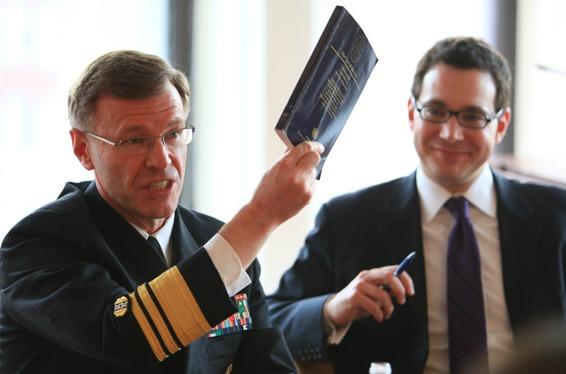Beyond Basic Training
Select members of the military's elite JAG Corps bring international law to life as students in the Law School's LL.M. program before returning to their posts around the world with a deeper understanding of the law.
New York, September 24, 2013—When Columbia Law School student Jessica Piquet ’14 needed help last year on a complicated law review note she was writing about piracy on the high seas, she didn’t have to look very far.
Two of her national security law classmates—Lieutenant Commander Steven Obert ’13 LL.M. and Commander Shane Cooper ’13 LL.M.—were Navy lawyers who had captured Somali pirates in separate, high profile encounters aboard the USS Nicholas and USS John C. Stennis, respectively. Obert and Cooper, members of the Navy Judge Advocate General’s Corps were at Columbia Law School on a 10-month leave to earn their master’s degree in law (LL.M.) as part of the Roger Hertog Program on Law and National Security’s elite JAG Scholars program.
Piquet had spent the previous summer researching piracy cases as an intern in the National Security Division of the U.S. Department of Justice. But she relished the opportunity to speak to lawyers who had encountered the issues aboard Navy warships. After efforts by Obert and Cooper to gather and preserve evidence and coordinate with other relevant countries and law enforcement personnel, the pirates in both their cases were prosecuted successfully.
“I had read the academic reasoning, but I was able to sit down with them and hear firsthand how difficult it is to keep hold of pirates,” Piquet said. “It was really helpful to be able to get their insight.”
Origins of the JAG Scholars Program
Obert and Cooper are just two of the many JAG officers who have studied in Morningside Heights since 2008 when Columbia Law School became one of the first civilian law schools to enter into a formal LL.M. agreement with the U.S. Navy.
Navy Reserve JAG Michael Bahar ’08 LL.M., now general counsel for the Democrats on the U.S. House of Representatives Permanent Select Committee on Intelligence, helped create the JAG Scholars program with Professor Matthew C. Waxman, Dean for Graduate Legal Studies Sylvia T. Polo, then-Navy Judge Advocate General Vice Admiral Bruce E. MacDonald, and then-Commander of the Naval Legal Service Command Rear Admiral James W. Houck.
| Vice Admiral James W. Houck and Professor Matthew C. Waxman |
“The problem was that people from schools like Columbia Law School weren’t going to the military—to the detriment of the military, the university, and ultimately the country,” Bahar said. “What drew me to it most was, how do we bridge that gap between the military and the civilian sector?”
Part of the idea behind the program was to foster and build upon a relationship of understanding between the military and a prestigious academic institution that is renowned for its international, national security, and comparative law programs.
“The military is such a vital legal community, both domestically and internationally,” said Waxman, who co-directs the Roger Hertog Program on Law and National Security. “It’s important that the Law School educate and learn from the lawyers who serve our country.”
Columbia Law School, which, like Columbia University, has an active military student life, has proven to be a supportive partner, increasing its contributions to a federal program that helps veterans pay for law school, and funding partial LL.M. tuition for up to two JAG officers from each branch of the military each year.
Classroom Collaboration
Current and former JAG Scholars say they are drawn to the Law School for the diversity of the J.D. and LL.M. student body and outstanding faculty members, including international and national security law scholars such as Waxman and Professors Sarah H. Cleveland and Lori Damrosch, as well as Visiting Scholar Harold Hongju Koh, former legal adviser to the U.S. Department of State.
According to professors, civilian students, and JAGs, it’s the exchange of ideas that drives the relationship.
“To be able to speak to someone who’s served as a JAG, to hear how they’ve thought about the issues, how their commanding officers have thought about the issues, it really puts things in a real-world perspective,” Piquet said.
Since 2008, the JAG Scholars program has expanded beyond the Navy, with the Law School entering into formal agreements with other branches of the U.S. military, and welcoming both U.S. and Canadian JAGs on campus each fall. And the relationship works both ways. After having exposure to JAG Scholars and the work they do, some J.D. students have gone on to pursue a career in the military.
Putting the Degree to Work
Besides combating piracy on the high seas, current and former JAG Scholars have, collectively, helped negotiate international agreements to conduct anti-trafficking training with African forces, worked on cyberspace operations at the Department of Defense, advised the government of Afghanistan on its security forces, counseled the U.S. Navy on surveillance in the Western Pacific, served as part of the White House national security team, and embedded with a classified SEAL team, among other assignments.
Cooper, now Fleet Judge Advocate for the U.S. Third Fleet in San Diego, said he’s applying what he learned at the Law School as he plans a joint Rim of the Pacific Exercise with his counterparts in 22 countries including Australia, Canada, and Japan. In particular, he said, a conference Cleveland organized on disputes in the South China Sea was “incredible.”
“My job is to head up the legal side, working with all the partner nations’ legal teams, taking into consideration every country’s national policies and legal limitations,” he said. “The training I received at Columbia Law School was amazing. I apply it almost every day here.”
Obert agreed.
“It’s given me such a broader view of how international legal frameworks take shape,” he said. “It’s a great skill to take into the fight.”
